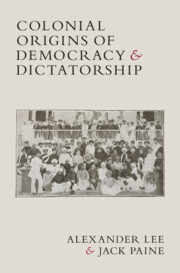
- Publisher:
- Cambridge University Press
- Online publication date:
- May 2024
- Print publication year:
- 2024
- Online ISBN:
- 9781009423526
- Subjects:
- Political Sociology, Politics and International Relations, Comparative Politics, Sociology

Why are some countries more democratic than others? For most non-European countries, elections began under Western colonial rule. However, existing research largely overlooks these democratic origins. Analyzing a global sample of colonies across four centuries, this book explains the emergence of colonial electoral institutions and their lasting impact. The degree of democracy in the metropole, the size of the white settler population, and pressure from non-Europeans all shaped the timing and form of colonial elections. White settlers and non-white middle classes educated in the colonizer's language usually gained early elections but settler minorities resisted subsequent franchise expansion. Authoritarian metropoles blocked elections entirely. Countries with lengthy exposure to competitive colonial institutions tended to consolidate democracies after independence. By contrast, countries with shorter electoral episodes usually shed democratic institutions and countries that were denied colonial elections consolidated stable dictatorships. Regime trajectories shaped by colonial rule persist to the present day.
‘This book offers the most systematic empirical treatment to date of colonial history as a factor in modern democracy. A signal contribution to the literature.’
John Gerring - , Department of Government, University of Texas, Austin and co-author of The Deep Roots of Modern Democracy: Geography and the Diffusion of Political Institutions
‘Bold, innovative, and magisterial: this impressive book is the new gold standard for empirical research on the colonial origins of democracy, dictatorship, and regime instability in different parts of the world. Lee and Paine have produced the most comprehensive data analysis of colonial electoral institutions and postcolonial democratization from the 1600s until the present. Their analysis forces us to rethink the strategic interactions that metropolitan actors, white colonial settlers, and non-white political actors that shaped the evolution of electoral and representative institutions in the Americas and across the Global South.’
Olukunle P. Owolabi - Villanova University
‘Not just a sweeping re-interpretation of how colonialism has shaped the modern democratic landscape, but also a substantial theoretical innovation which helps us reconceptualize the forces creating (or destroying) democracy in these troubled times.’
James A. Robinson - University Professor, University of Chicago
‘In this pathbreaking book Alexander Lee and Jack Paine show how heavily democracy in many countries today has been influenced by historical struggles between European colonizers, settlers, and colonized peoples. This is a major contribution to our understanding of political regimes across the globe.’
David Stasavage - Dean for the Social Sciences and Julius Silver Professor, Department of Politics, New York University School of Law
‘In this pathbreaking empirical study, Lee and Paine illuminate the complex ways in which colonialism shaped the prospects for democracy in countries emerging from imperial rule.’
John Ikenberry Source: Foreign Affairs
‘The book offers a powerful and persuasive argument about the enduring influence of such institutions; it convincingly explains why democracy emerged and persisted in some parts of the non-European world, while faltering in others. It is an essential read for scholars of comparative politics, particularly those researching democratization and international development, as well as practitioners interested in understanding the enduring effects of colonial rule on democratic governance.’
Shagun Gupta Source: International Affairs
 Loading metrics...
Loading metrics...
* Views captured on Cambridge Core between #date#. This data will be updated every 24 hours.
Usage data cannot currently be displayed.
Accessibility compliance for the PDF of this book is currently unknown and may be updated in the future.